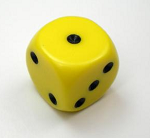|
Overemotional Robot posted:I don't like d6 with mod damage in place of DWs way of doing. Even though this makes more sense, sometimes rolling different die is fun. The only problem with having different dice is that it makes the math weird and can make things more swingy as a consequence. Damage and HP are the parts of DW that are tied together and just stick out as one of the weird warts of the game that comes from its D&D heritage. There's probably still a way to roll damage dice without it actually involving HP like requiring 4+ on a damage die to deal 1 harm and a bonus harm on 7+.
|
|
|
|

|
| # ? Jun 8, 2024 03:03 |
|
Pollyanna posted:The more I look over my front, the less happy I am with it. The cast is okay, but I don’t think I have the ideas of fronts, dangers, and portents down right. A front is an organizational tool. Scope is a little fuzzy, but the pat answer is that an adventure front helps you create and respond to scenes and a campaign front helps you create and respond to adventures. If "investigating the ruins" is looking to be maybe a 2-3 session thing, it's one adventure front, and it's fine to have a campaign front that's mostly question marks to start. Whenever something happens that seems like it might be important after those 2-3 sessions, make note of it in the campaign scratchpad. A useful portent is something that the PCs will see and want to investigate so they can stop the next link in the chain. As such, when you're having one come in and go crazy, you might want to hint there is a next link in the chain if it's not obvious, like having all the elemental ghosts that show up moaning the same name or something. For what it's worth, I'd be confident enough to sit down and start running an adventure on what you've got there.
|
|
|
|
Hmmm, I canít see all of that poo poo resolving in 2-3 sessions unless we really fuckin hustle. That means itís gonna be a campaign front...and therefore thereís 1-2 adventure-level fronts to create from it for next session. Okay, I think I can do that. I might have to replace stuff in the campaign front with poo poo that comes up ingame as it goes, but itís prolly better than poo poo Iíd come up with.
|
|
|
|
So are the adventure fronts derived from a given campaign front, if I started with one? Like, am I supposed to write down dangers and impending dooms that proc the grim portents in the campaign front? Or are they supposed to stay independent? Edit: Gah, I may have made a mistake by making my campaign front centered around a specific location. Now the players can't go anywhere else, cause all the action is in the ruins we started at. The Ruins front is basically "prevent the end of the world in two different ways and prevent some ambitious dickwads from getting world-ending power in another", and as written assumes that everything happens in that specific megadungeon. It really genuinely doesn't fit a 2-3 session adventure front and if used as a campaign front limits the world and scenes to what amounts to like 10~15 acres and a village. Edit 2: gently caress it, this is the adventure front. I'll make a super vague campaign front instead. Pollyanna fucked around with this message at 01:17 on Sep 19, 2018 |
|
|
|
Yes, the adventure fronts are roughly derived from a given campaign front. Not necessarily one-to-one, but if you're bringing a campaign threat into an adventure front, the adventure should incorporate some kind of connection between two of the campaign-scale portents. One easy dodge if you want a big megadungeon and also some world adventure is to say that the gods scattered fragments of this ruin to the four corners of the earth to prevent it from being easily used for its intended purpose, and now you've got to go to the ice world to find the next crucial keystone/activate the next leg of the machinery that's currently phased out of reality. (Another easy dodge is that nobody's ever really seen world-ending power because the world's still here, so whatever happens can at worst create a significant new power base.) Anyway, stop kicking yourself about all this. The entire point of prep is to trip on your own feet in advance so you don't fall down when you're playing.
|
|
|
|
Trying out the adventure front, it seems way too vague and abstract to help move the game along. The game felt like treading water a bit, and nothing interesting happened because we spent an hour and a half just to lose the treasure the party found first session. Which is entirely my fault. I think I need an adventure front that more immediately represents the situation and what the players actually want to do via their characters. Unfortunately, I canít say tonightís Dungeon World game was particularly successful. We got about 1hr and 30 minutes of gametime in, since we spent an hour going over the characters and their backstories so I could mine it for connections to the front. I chose to start them at the elderís house, telling them they have yet to get paid. The elder loving sucks, heís an unfunny moron who doesnít know anything and outright failed to tell the whole truth of his peopleís legend to the party cuz I withheld some of it because...I donít remember why. In terms of things accomplished: - Got 5 coin - Opened that cool chest - Got the item inside stolen by a beaverpig - Killed a beaverpig - Interrogated the elder about the item - Got the item stolen via telekinesis by a cultist - Completely failed to catch the cultist by combo of partial success rolls and me just not wanting them to catch up cuz ďsoft and hard movesĒ - Failed at being a ranger cuz the cultist teleported away and left no track to follow - Interrogated a really freaked out villager about the item that got stolen - Wrested the whole legend from the elder and learned the identity of the item (which may not actually be true but they have no way of knowing) A few things I need to improve on: - Looking back at the GM moves whenever it was my move slowed me down more than anything. Instead of letting the story flow naturally from what happened, I had to come up with something that clearly matched the moves, leading to stupid poo poo like Reveal an Unwelcome Truth + partial success = ďuhh I know youíre a ranger and everything but you have no idea where this guy went, itís like he just disappeared, no trail sryĒ. Additionally, the moves seem specifically tailored to dungeon diving and stuff - precisely 0% of which we did this session, which was spent getting our butts kicked by a pig and a lovely overpowered NPC. I kinda miss my old style of play. - Iím genuinely hampered by my establishment and prep not providing an opportunity for the players to be cool, and I still donít know how to do that anyway. A bard and a ranger arenít much good in the ruins of a dungeon, but neither should they just be denied their tracking abilities or the use of their instrument (ďa 6 for defy danger? uhhhh *stares at sheet* [use up their resources + downside of their class = ] you fall backwards and break the strings on your luteĒ). Iím going to revise the front to be more overland instead. - How do you think off screen and follow the current fiction at the same time? Iím busy dealing with my players threatening villagers and fire clawing bushes to move offscreen plans along. Am I supposed to do that between sessions? - I still donít have a good sense of loot n coin n stuff. I wanna use these magic items dammit! - It is surprisingly hard to make ďyouíre in town what doĒ interesting. In fact, that was awful. Next time weíre fast forwarding to a battle. Maybe it was just a super off day for me, and it kinda was and Iím basically just venting right now, but I had no imagination or creative spark today. Or maybe there's just inherent things about the system and about PbtA that I still don't understand properly. Maybe next time I'll do better. Pollyanna fucked around with this message at 02:00 on Sep 20, 2018 |
|
|
|
As far as always using moves, I've found it helpful to do whatever the hell I want and then after the session go "ah yes, this was clearly Show a Downside - that one was Use Their Resources. I'm so good at this." For me, having the list of GM Moves is mostly a way to remind myself never to go "oh huh, yeah, that's nothing interesting... don't have anything prepped here... yeah nothing happens... now what do you do?". And I don't really think in terms of GM moves for partials anyway - those usually come with their own downsides. As for coin, have a look at the treasure table for monsters. The values sort of surprised me, at least. You can find 4d10 coins or 2d10x100 coins worth of fine art in an orc's stash, so probably don't sweat someone offering the characters a cool hundo for whatever. It might help you to work out what the characters want to buy. For instance, if a Perilous Journey is in the cards, work out how much they'll be spending on rations and decide whether that amount should be NBD or ruinous. If they want to buy a boat, keep or tavern, plop down an arbitrary cost for it and dole out that/n over n sessions.
|
|
|
|
Shanty posted:As far as always using moves, I've found it helpful to do whatever the hell I want and then after the session go "ah yes, this was clearly Show a Downside - that one was Use Their Resources. I'm so good at this."  GM moves for me are there for the 1 in 100 times all my players look at me, I can't think of something right away, I glance at them, see "Seperate them" and go "christ OK that could be fun and makes sense" Then away we go. Otherwise the fiction snowballs into itself so hard it's very easy to just keep stuff happening to the PCs
|
|
|
|
Xelkelvos posted:The only problem with having different dice is that it makes the math weird and can make things more swingy as a consequence. Damage and HP are the parts of DW that are tied together and just stick out as one of the weird warts of the game that comes from its D&D heritage. There's probably still a way to roll damage dice without it actually involving HP like requiring 4+ on a damage die to deal 1 harm and a bonus harm on 7+. I think what I really liked is having players roll a d12 and them seeing that a monster was serious business. The move to standardized die makes sense, though, and I'm going to run this version of DW soon because I like a lot of the class changes.
|
|
|
|
Shanty posted:And I don't really think in terms of GM moves for partials anyway - those usually come with their own downsides. Make moves all the time! Make moves on a 10+! When you talk as a GM you can talk to describe the fantastic world or fill your players' lives with adventure but when you want the players to respond you should always finish with a move. What moves do you make on a 10+? Play to a class, offer an opportunity, tell them the requirements, show an approaching threat. You can do all of that without compromising an inmediate success. And on a 7-9 like the Hunt and Track 7-9, where the move doesn't say anything about a downside, try not to compromise that either. The downside is the ranger doesn't get to play Sherlock along the way.
|
|
|
|
Glazius posted:Make moves all the time! Make moves on a 10+! When you talk as a GM you can talk to describe the fantastic world or fill your players' lives with adventure but when you want the players to respond you should always finish with a move. No, I mean, I'm always making moves since the players are always looking to me to see what happens. But for player moves the move generally sorts itself out, and THEN they look to me, so I describe what follows that move. Even on a miss, it can often make sense to follow the "punishment" move with something else. As a simple example, the threat just Deals Damage and then something else Puts Someone in a Spot to keep the action flowing. Same thing on a hit, the success thing is narrated and then something else happens. And like, I don't consider "worse outcome" from Defy Danger a Move, for instance. Nor the attract unwanted attention things. You don't need the Move mechanic there, the fiction and wording of the partial should be enough. Although it doesn't hurt to think in those terms, of course.
|
|
|
|
Players also have a habit of butting in immediately as something resolves and also acting independently, so IMO itís important to take your time as youíre responding to player moves. I know you all want to act but lemme throw the ball to you when Iím ready!!!
|
|
|
|
Pollyanna posted:Players also have a habit of butting in immediately as something resolves and also acting independently, so IMO itís important to take your time as youíre responding to player moves. I know you all want to act but lemme throw the ball to you when Iím ready!!! I've found that this is incredibly frustrating, even in non-DW games.
|
|
|
|
Tir McDohl posted:I've found that this is incredibly frustrating, even in non-DW games. Man, I'm still getting used to GMing. Lemme take things a bit slow as I ramp up.
|
|
|
Pollyanna posted:Players also have a habit of butting in immediately as something resolves and also acting independently, so IMO it’s important to take your time as you’re responding to player moves. I know you all want to act but lemme throw the ball to you when I’m ready!!! I always have players do this to each other even, like they're playing an interrupt card or something. "Don't negate, extrapolate!" I always tell them, pounding my fist in the table.
|
|
|
|
|
Shanty posted:And like, I don't consider "worse outcome" from Defy Danger a Move, for instance. Nor the attract unwanted attention things. You don't need the Move mechanic there, the fiction and wording of the partial should be enough. Although it doesn't hurt to think in those terms, of course. What is "the Move mechanic"? I'm talking about GM moves, the things you say, rather than player moves, a script for shared player/GM interaction that may involve rolling dice. Anyway, I wanted to drop some more hot deetz here but I couldn't do it with a phone post. So: Pollyanna posted:Trying out the adventure front, it seems way too vague and abstract to help move the game along. The game felt like treading water a bit, and nothing interesting happened because we spent an hour and a half just to lose the treasure the party found first session. Which is entirely my fault. I think I need an adventure front that more immediately represents the situation and what the players actually want to do via their characters. Well, yeah, in the same way that the adventure front should be dealing with links between portents in the campaign front, notable scenes in the adventure should mostly be dealing with some of the links between portents in the adventure front. How is the shadowy government organization going to get itself established? What's the cult doing to get into that library? Pollyanna posted:- Looking back at the GM moves whenever it was my move slowed me down more than anything. Instead of letting the story flow naturally from what happened, I had to come up with something that clearly matched the moves, leading to stupid poo poo like Reveal an Unwelcome Truth + partial success = "uhh I know you're a ranger and everything but you have no idea where this guy went, it's like he just disappeared, no trail sry". Additionally, the moves seem specifically tailored to dungeon diving and stuff - precisely 0% of which we did this session, which was spent getting our butts kicked by a pig and a lovely overpowered NPC. I kinda miss my old style of play. It's kind of the opposite mentality, really. When you're saying what seems to you like the next step in the story, check your moves to make sure that you're offering some hook or obstacle for the PCs. It'll get easier as you internalize the move list. Pollyanna posted:- I'm genuinely hampered by my establishment and prep not providing an opportunity for the players to be cool, and I still don't know how to do that anyway. A bard and a ranger aren't much good in the ruins of a dungeon, but neither should they just be denied their tracking abilities or the use of their instrument ("a 6 for defy danger? uhhhh *stares at sheet* [use up their resources + downside of their class = ] you fall backwards and break the strings on your lute"). I'm going to revise the front to be more overland instead. Why is a ranger not good in a dungeon? Tracking just works on following a trail, it doesn't say anything about through a natural environment. And unless their animal companion is a claustrophobic elephant or something, it's still there and being fun. Likewise for bards - Bardic Lore can certainly cover many things in a dungeon, unless their lore was, like, other planes of existence or something. And Arcane Art is useful if something needs to have an enchantment broken, like if it was being controlled by some cult or something. Charming and Open should have done some things for the Bard otherwise, too. The Bard can get the truth out of people as long as they're willing to be truthful. So, like, in D&D you can just put stuff up and rely on your players to know their characters and how to deal with it? That's a sentiment I see a lot of when people talk about running D&D. That doesn't work so well in Dungeon World. Not only are you going to find it harder to pitch opportunities to classes you can miss out on chances people have to activate the moves they know already. You should know your players' playbooks as well as they do, or at least have your own reference copy. It's just a sheet or two of paper, no big. Pollyanna posted:- How do you think off screen and follow the current fiction at the same time? I'm busy dealing with my players threatening villagers and fire clawing bushes to move offscreen plans along. Am I supposed to do that between sessions? What's that cultist doing now that they've teleported out of there? Where'd they land? Where are they going? What are the villagers saying about the PCs when they've gone haring off after the cultist? What's waiting for them when they get back? Literally anything the PC's don't annihilate and stuff in their pack is going to keep existing while they're not there. Think about what it's doing while they're gone or before they get there. Pollyanna posted:Maybe it was just a super off day for me, and it kinda was[...] Dungeon World will also suffer more than D&D if you're having an off day, since it's very demanding in the act of running it.
|
|
|
|
Pollyanna posted:Man, I'm still getting used to GMing. Lemme take things a bit slow as I ramp up. To start with, don't over-think it. The GM moves exist to prod your creative juices when you get momentarily stuck. If you already have an idea for what happens next, go with that. Chances are, it maps to a GM move just fine. It's when you can't immediately think of three things that could reasonably happen next that looking at the list is super helpful. Also, all of the PbtA games are "fail forward" games. Ideally, this means that regardless of the outcome of the player's roll, the story keeps moving. A failure on opening the chest should never mean, "You found nothing. There are no clues. End of story." Or worse, "You can't open the chest." It should be something like, "z0MG, the chest is full of angry, enchanted bees!" Then, once the angry, enchanted bees are dealt with, you (the GM) are there to keep the story moving. "You, Plucks McSingsong, have heard tales of the dreaded 'angry enchanted bee trap' before, purportedly the work of a fell pig-sorcerer who dwells in a twisted tower in the Misty Vale. Whatever was in this chest, it was likely taken by said sorcerer." This is you revealing an unwelcome truth, and doing so in such a way as to make the Bard feel useful and important. Here's the important thing to remember with PbtA games - failure doesn't mean that you accomplish nothing, it's that you don't accomplish the exact thing you intended. A miss can absolutely result in succeeding at the thing you set out to attempt, but succeeding in such a way that now you have a new (and often bigger) problem. An example I remember giving on the DW forums is climbing a cliff - a fairly straightforward Roll+DEX to defy danger. A miss could mean all sorts of things - a fall, the loss of an important piece of gear or a cherished Hireling, etc. Or it could mean making it all the way to the top and dragging yourself exhausted over the lip of the cliff only to have someone stick a spear in your face and say, "Thor's balls, you climb slowly! We didn't think you were ever going to make it! But I bet you wouldn't die, so Haemish owes me money. Clap 'im in irons, boys, we'll see what Lord Mournvale wants done with him. Fair warning, you'll likely be hung on the morrow. Right, off we go, then!" <-- this is me capturing someone, and it's a "hard move" because I'm narrating the situation and the consequences at the same time before handing the narrative agency back to the player. So yeah, you failed to roll - but you still made it up the cliff. I didn't stonewall you and say, "No, you can't climb this cliff no matter how hard you try." Finally, that's not to say that I couldn't have stonewalled you on the cliff, but if I did so the follow-up move to the consequence I narrate as a response to your failed roll had better include something along the lines of present an opportunity with a cost. That might look something like, "after the resulting rock-slide summarily deposits you back at the base of the cliff and inflicts X damage, you realize that further attempts to climb here are tantamount to an elaborate and strenuous way to commit suicide. Rumor has it that there are cave complexes that offer another route to the top, but rumor also has it that those cave complexes are labyrinthine and full of Kobolds. Or you could travel several days to the east, where the escarpment falls away and the slope is more gradual. But that might give the evil pig-sorcerer more time to complete his infernal plans. What do you do?" Essentially, it's incumbent upon you to present interesting alternative routes to success when the players flub rolls. A miss doesn't always mean straight up failure. Often, it means success with disastrous complications. Does that make sense? Does it help?
|
|
|
|
Realtalk: all these beaverpigs and pig sorcerers are making me want to play in this fantastic porcine world
|
|
|
|
Technically, itís a woodpig. A cross between a woodchuck and a mini pig.  RudeCat posted:I always have players do this to each other even, like they're playing an interrupt card or something. "Don't negate, extrapolate!" I always tell them, pounding my fist in the table. I mean, Iím glad theyíre excited, but Iím also ADD as hell and I need structure/organization  Glazius posted:Well, yeah, in the same way that the adventure front should be dealing with links between portents in the campaign front, notable scenes in the adventure should mostly be dealing with some of the links between portents in the adventure front. How is the shadowy government organization going to get itself established? What's the cult doing to get into that library? That makes a lot of sense, yeah. Though that also begs the question: doesnít setting up an adventure front that involves two of the campaign dangers mean that a starting situation becomes ďA is going to do X Y Z and B will do I J KĒ, and basically railroads the non-player parts? I know that Iím the one in charge of the world and what happens in it, but wouldnít I be forcing the party to deal with them? Thatís the intent of the fronts, I know, but...Iím just scared of accidentally railroading the game. quote:
That makes more sense - so itís more like, doublecheck that what youíre doing embodies a GM move in some way. Thatís easier to do for me. quote:Why is a ranger not good in a dungeon? Tracking just works on following a trail, it doesn't say anything about through a natural environment. And unless their animal companion is a claustrophobic elephant or something, it's still there and being fun. Likewise for bards - Bardic Lore can certainly cover many things in a dungeon, unless their lore was, like, other planes of existence or something. And Arcane Art is useful if something needs to have an enchantment broken, like if it was being controlled by some cult or something. The Bard will be fine with how weíve established the world, but the Ranger is basically a vagabond with a hawk buddy that he loves to use. Heís expressed interest in wide open spaces where his hawk can do stuff. So I mean, I could do a few things: - The ruins are more of a compound ala Tikal or Chichen Itza - The ruins lead into a Vernesian underground foresty area - The ruins arenít the only site of their adventure (most obvious pick) - The ruins are broad and wide open and have a major vertical component (could be interesting) Though that may or may not actually help the Ranger do stuff. I dunno, this is all because I saw the player be a little disengaged during the dungeon diving in the first session. Maybe Iím overthinking it. quote:
Yyyeah, Iím realizing that now. Theyíve expressed a little disappointment that they donít have chances to use their cool moves and that they want to level up more quickly. Iím gonna have to keep a copy of their books on hand... quote:What's that cultist doing now that they've teleported out of there? Where'd they land? Where are they going? What are the villagers saying about the PCs when they've gone haring off after the cultist? What's waiting for them when they get back? Those questions are easy to answer once youíre a day or two out from the game, but thinking about the fallout at the same time as poo poo is going down is a good bit harder for me. If itís okay, a lag time of a session or so on this would help. quote:Dungeon World will also suffer more than D&D if you're having an off day, since it's very demanding in the act of running it. Oh jesus yes  if my already-weak creativity suffers the game does too. Maybe I should have some coffee or something before the game. if my already-weak creativity suffers the game does too. Maybe I should have some coffee or something before the game.
|
|
|
|
Ilor posted:I'm coming late to this conversation because I was away on work travel, just catching up now. But here are a few things to think about, in no particular order. Easy enough. Justifying my moves is easier to do than working backwards. quote:Also, all of the PbtA games are "fail forward" games. Ideally, this means that regardless of the outcome of the player's roll, the story keeps moving. A failure on opening the chest should never mean, "You found nothing. There are no clues. End of story." Or worse, "You can't open the chest." It should be something like, "z0MG, the chest is full of angry, enchanted bees!" Then, once the angry, enchanted bees are dealt with, you (the GM) are there to keep the story moving. "You, Plucks McSingsong, have heard tales of the dreaded 'angry enchanted bee trap' before, purportedly the work of a fell pig-sorcerer who dwells in a twisted tower in the Misty Vale. Whatever was in this chest, it was likely taken by said sorcerer." This is you revealing an unwelcome truth, and doing so in such a way as to make the Bard feel useful and important. Regarding this, there was a particular situation here: they learned they could open a chest with the charm shaped as the villageís crest, they decided to open the chest facing away from themselves in case it was trapped, the woodpig that charged them earlier (and that they had piledrived into the ground) lept up and snatched the item in the chest, one player said they wanted to investigate the chest and see if anything else was in it, I said ďno, all you see is some nondescript dust and debris and a depression in the velvet where the item once was, yo the woodpig is getting away and is at the edge of the forest, WYD?Ē Should there have been something in the box anyway? (Now that I think about it...I donít even know why I decided to get the item stolen from them. That may have been a bad idea.) quote:Here's the important thing to remember with PbtA games - failure doesn't mean that you accomplish nothing, it's that you don't accomplish the exact thing you intended. A miss can absolutely result in succeeding at the thing you set out to attempt, but succeeding in such a way that now you have a new (and often bigger) problem. An example I remember giving on the DW forums is climbing a cliff - a fairly straightforward Roll+DEX to defy danger. A miss could mean all sorts of things - a fall, the loss of an important piece of gear or a cherished Hireling, etc. Or it could mean making it all the way to the top and dragging yourself exhausted over the lip of the cliff only to have someone stick a spear in your face and say, "Thor's balls, you climb slowly! We didn't think you were ever going to make it! But I bet you wouldn't die, so Haemish owes me money. Clap 'im in irons, boys, we'll see what Lord Mournvale wants done with him. Fair warning, you'll likely be hung on the morrow. Right, off we go, then!" <-- this is me capturing someone, and it's a "hard move" because I'm narrating the situation and the consequences at the same time before handing the narrative agency back to the player. So yeah, you failed to roll - but you still made it up the cliff. I didn't stonewall you and say, "No, you can't climb this cliff no matter how hard you try." Yeah, this makes sense. Success with a cost, complications, all that. I havenít had an issue with that part yet, though I do need some practice as I go.
|
|
|
|
Pollyanna posted:Should there have been something in the box anyway?
|
|
|
|
Golden Bee posted:Nope. Describe the situation. Make a move that follows. Not everything players do will work!  That works for me. That works for me.Speaking of, dungeons: how much do you make in advance? I get the general principle of making moves as the fiction demands it and improvising stuff as your principles and agenda dictate, but the reality of effort and improvisational talent means you have to strike a balance between drawing things up front and changing things to suit your players' needs. I'm currently reading through The Perilous Wilds, and it seems like they suggest coming up with themes and size in advance. Should I be improvising dungeons just like I would improvise the world and its state? If so, what're some ways I can make that easier and less stressful, aside from what Perilous Wilds provides?
|
|
|
|
Pollyanna posted:Technically, itís a woodpig. A cross between a woodchuck and a mini pig. I have glimpsed this world. https://www.youtube.com/watch?v=DehJuehK66A Pollyanna posted:That makes a lot of sense, yeah. Though that also begs the question: doesnít setting up an adventure front that involves two of the campaign dangers mean that a starting situation becomes ďA is going to do X Y Z and B will do I J KĒ, and basically railroads the non-player parts? I know that Iím the one in charge of the world and what happens in it, but wouldnít I be forcing the party to deal with them? Thatís the intent of the fronts, I know, but...Iím just scared of accidentally railroading the game. Pollyanna posted:Speaking of, dungeons: how much do you make in advance? I get the general principle of making moves as the fiction demands it and improvising stuff as your principles and agenda dictate, but the reality of effort and improvisational talent means you have to strike a balance between drawing things up front and changing things to suit your players' needs. I'm currently reading through The Perilous Wilds, and it seems like they suggest coming up with themes and size in advance. Both of these questions have the same broad answer. Draw maps, leave blanks. Know how things would progress if the PCs weren't there, and sketch out a danger's moves so you have a rough blueprint of how they react to unexpected things like player characters. Plan out the rough shape of "the dungeon" and its more notable places, but leave some connective tissue unspecified, and sketch out the dungeon's moves so you know what's there for unpredictable people like player characters. Crucially, you shouldn't necessarily plan for your antagonists to succeed. That doesn't mean they shouldn't try, but give the PCs a victory if they earn it. If they fail, their danger moves will inform their response. Pollyanna posted:The Bard will be fine with how weíve established the world, but the Ranger is basically a vagabond with a hawk buddy that he loves to use. Heís expressed interest in wide open spaces where his hawk can do stuff. Don't worry about justifying what the hawk can and can't do based on how much space there is in the environment. Animal companions are limited by their weaknesses already, that hawk may as well be a quadcopter for purposes of operating in tight spaces. I was thinking of the ruins initially as Chichen Itza style? Like it wasn't just "oh there's a weird stairway somehow" but somebody wakes up one morning all like "what the gently caress where'd this Chichen Itza come from?" That said, it's hardly some proper ruins if a passage doesn't suddenly jaggedly trail off, revealing a massive yawning pit of blackness, underground rivers falling into the deep, and a chain three feet thick stretching out to a stone maze suspended in the center. You know, the fun poo poo. Pollyanna posted:Those questions are easy to answer once youíre a day or two out from the game, but thinking about the fallout at the same time as poo poo is going down is a good bit harder for me. If itís okay, a lag time of a session or so on this would help. I don't know what your typical play environment is going to be, but does it preclude taking a 5-10 minute water break to stop and think?
|
|
|
|
Glazius posted:I have glimpsed this world. I should pick this up at some point. I just don't have the time quote:Both of these questions have the same broad answer. Draw maps, leave blanks. Know how things would progress if the PCs weren't there, and sketch out a danger's moves so you have a rough blueprint of how they react to unexpected things like player characters. Plan out the rough shape of "the dungeon" and its more notable places, but leave some connective tissue unspecified, and sketch out the dungeon's moves so you know what's there for unpredictable people like player characters. But if the intent is to advance your fronts as you go, won't all your fronts and dangers eventually complete themselves? That seems to predispose them to success. I guess the obvious answer there is "the party should be able to completely destroy a danger", though... As for dungeons, that's a little easier for me to handle. Five Room Dungeons and the concept of a dungeon as an undirected (or maybe even directed!) graph is simple enough to put together (maybe I'll actually loving practice my graph theory), and then the question just becomes "what's in it". That said, I do need to actually know what kind of stuff the dungeon has, what I want the dungeon to cover, and how to make sure what I add to the dungeon does the following: 1. Follows the Agenda 2. Sticks to the Principles 3. Advances Grim Portents 4. Offers opportunities to get XP of which #1 and #3 are the bigger bastards. So far, Perilous Wilds is helping with that. quote:Don't worry about justifying what the hawk can and can't do based on how much space there is in the environment. Animal companions are limited by their weaknesses already, that hawk may as well be a quadcopter for purposes of operating in tight spaces. That's true, but I also don't want to waste the player's time by putting them in situations where their hawk won't be at 100%. We only have about 2.5 hrs to play...then again, maybe I'm overthinking it. quote:I was thinking of the ruins initially as Chichen Itza style? Like it wasn't just "oh there's a weird stairway somehow" but somebody wakes up one morning all like "what the gently caress where'd this Chichen Itza come from?" My original idea was an ancient-tech supercomplex ala La Mulana that had a tip of the iceberg rise out of the ground. The ancient-tech is still a thing, but due to the differences between video games and tabletop RPGs, maybe not so much the supercomplex? Though I could definitely explore how the land changed as a result of it breaching...hey, that's not a bad idea for a front. The Warping Willows. Though, are fronts not supposed to literally be locations? quote:I don't know what your typical play environment is going to be, but does it preclude taking a 5-10 minute water break to stop and think? I'm gonna start enforcing this, I think - 10 minute break every hour.
|
|
|
|
Pollyanna posted:But if the intent is to advance your fronts as you go, won't all your fronts and dangers eventually complete themselves? That seems to predispose them to success. I guess the obvious answer there is "the party should be able to completely destroy a danger", though... Fronts are "everything you need for an adventure". All the dangers, all the portents, all the places. Adventures can span multiple locations, but usually when that happens each location is a notably distinct and dangerous part of a larger location. Something else you might want to consider if you want to make more surface stuff is, well, why would this stop coming up to the surface, now that it's started? All your dangers are supposed to be able to get themselves to doom, assuming PCs and other dangers don't interfere. But if they do interfere, that can break links in the chain, force portents down different paths, delay a doom. Until a danger is gone it will keep planning but not at the pace or with the ease it did before the PCs got shirty with it, but it's totally legitimate for PCs to take dangers off the table, by annihilating them or otherwise neutering their capacity for aggression.
|
|
|
|
Is there a prophecy type move in any playbook? Something where someone sleeps and gets a dream or anything like that?
|
|
|
|
Overemotional Robot posted:Is there a prophecy type move in any playbook? Something where someone sleeps and gets a dream or anything like that? Star Mage has one where they get to read the stars and get a prophecy from the GM. I think of it as the "force the DM to live with the consequences of their improv" move. First time he pulled it on me I mumbled a hasty "oh uh...the priest...Brian the Blessed...he uh...wants to destroy magic" and then had to bullshit some conspiracy for them to investigate that ended up being the bulk of the next 6 sessions. The Templar from GrimWorld also has retroactive prophetic dreams - I think it's just one reroll per day due to dream messages from their deity, which is pretty hilarious when their god sends them warnings about runaway carts or dodgy roof tiles.
|
|
|
|
Could be a cool custom move. Next session, #3, on Wednesday. The feedback I got was ďmore dungeoningĒ and ďless slowĒ, so I brainstormed an adventure front and a few monsters and came up with a plan: - Start in a dungeon with a basic hook (ďsomeone saw a cultist with your treasure going inside, get it back!Ē) - Provide as many opportunities as possible to get non-failure XP (alignments, notable monsters, treasures, etc.) - Retroactively award them some loot cuz itís been 2 sessions with nothing to show for it (20 coins each maybe? possibly some interesting items?) In which case, Iíll have to actually write the stats and moves for the monsters, and compile some magic items. I wonder if I can print stuff on index cards?
|
|
|
|
Along similar lines, the Elf Playbook has a move where you basically listen to Grim Portent FM but the GM also has to tell you something helpful for opposing it.
|
|
|
|
Ah, ok, thanks. That helps a lot.
|
|
|
|
Overemotional Robot posted:Is there a prophecy type move in any playbook? Something where someone sleeps and gets a dream or anything like that? Communion of Whispers in the Druid playbook is sort of this.
|
|
|
|
How strictly should I be sticking to the ďwhatever moves you make reflects the PCsĒ thing? Sometimes I have no ideas for how to make whatever the Bard finds something that takes advantage of their class. Sometimes itís just a simple goblin, man. Not everything has to be a masterstroke of GMing Iím so tired  I do enjoy when the vaporwave Wizard points his VHS staff at a conglomerate of platelets, honeycombs the barricade to try and free the Bard, and then the Ranger gets stuck in the wall Winnie-the-Pooh style. That partís great. The part where I have to be clever isnít
|
|
|
|
The line is "offer an opportunity that fits a class's abilities". None of it says that has to be the class of the spotlight player. Or a class that's actually in the party.  As far as loot goes, monsters and traps create kind of a "loot commitment", if that makes sense? It doesn't make sense for some hunting ocelots to be carrying anything on them, so just roll up treasure from their damage dice and save it for later.
|
|
|
|
The other thing to remember is that if your inspiration flags, it's OK to ask the table. If a player rolls a 7-9 on a Defy Danger to, I don't know, jump over a hole, you can just ask them "OK: you have succeeded, but something has gone wrong. What is it?"
|
|
|
|
People get upset about ďcrossing the lineĒ if you have players determine the world state, sometimes.
|
|
|
|
Whybird posted:The other thing to remember is that if your inspiration flags, it's OK to ask the table. If a player rolls a 7-9 on a Defy Danger to, I don't know, jump over a hole, you can just ask them "OK: you have succeeded, but something has gone wrong. What is it?" I do this all the time. It also has the perk that players will come up with much crueler ideas then the GM and the players seem more open to them then if I were to suggest it.
|
|
|
|
Demon_Corsair posted:I do this all the time. It also has the perk that players will come up with much crueler ideas then the GM and the players seem more open to them then if I were to suggest it. I've occasionally had players screaming at each other to shut up after they got a 6- on Spout Lore and I told them "Sure, you know exactly what this thing is and can do, and everything about it is bad news. What do you know?"
|
|
|
|
Whybird posted:I've occasionally had players screaming at each other to shut up after they got a 6- on Spout Lore and I told them "Sure, you know exactly what this thing is and can do, and everything about it is bad news. What do you know?" Using this, thank you~ The bratty little tinkerer/mechanic my players rescued in the first session has turned out to be very interested in the artifacts and materials that litter the ruins, and asked the party to return any interesting stuff they find to her for research. Keeping in theme with the RE4-like composite treasure, and the fact that the theme of the adventure is "biomechanical god cells vs. vaporwave cultists", I've got to come up with a bunch of examples of 1980's era machinery and technology. Some things I've got in mind that they could assemble: - casette tapes - hand phones - boom boxes/tape decks ...and not a whole lot else. Unfortunately, I wasn't alive for the 80s, and was barely conscious up until the mid-90s. What kinda tech-y treasures should I come up with for them? Pollyanna fucked around with this message at 18:37 on Oct 8, 2018 |
|
|
|
Google "1980s tech" and you should be solid? Cathode ray tubes and anything rectangular and beige.
|
|
|
|

|
| # ? Jun 8, 2024 03:03 |
|
the fax machine laser disc bangle bracelets Swatch watches
|
|
|

























